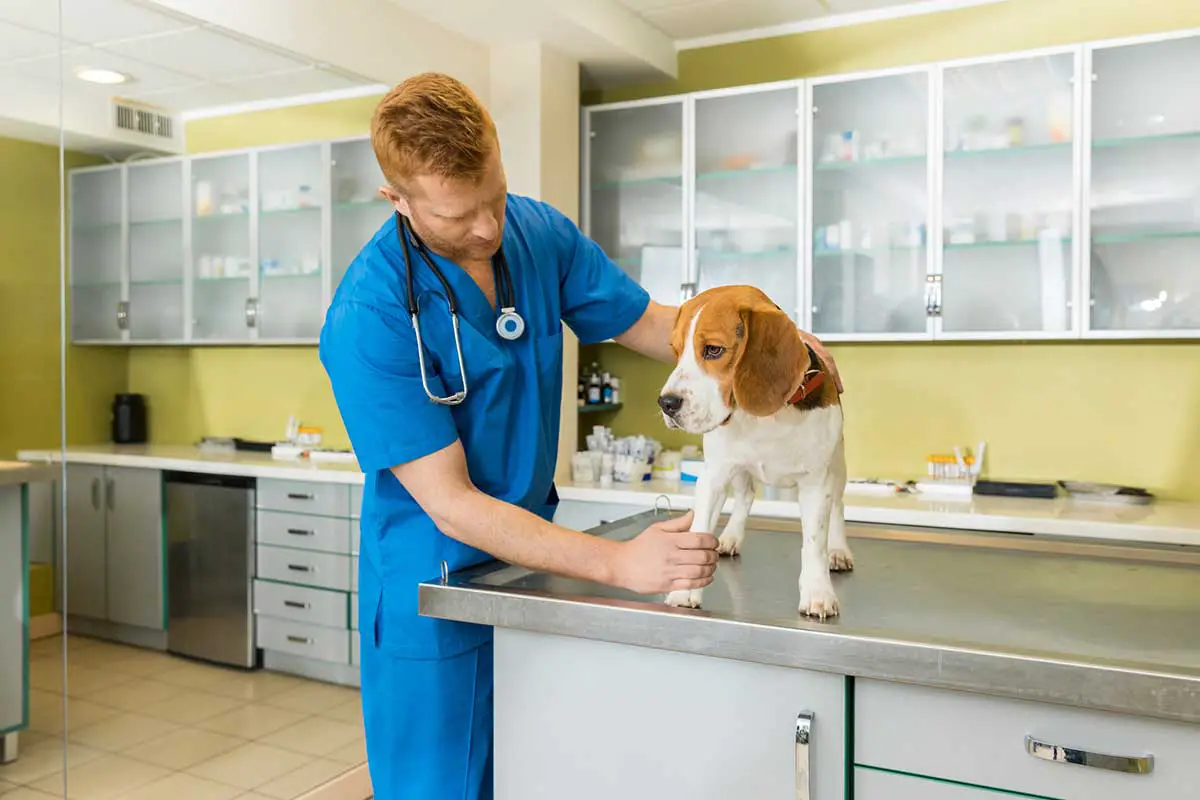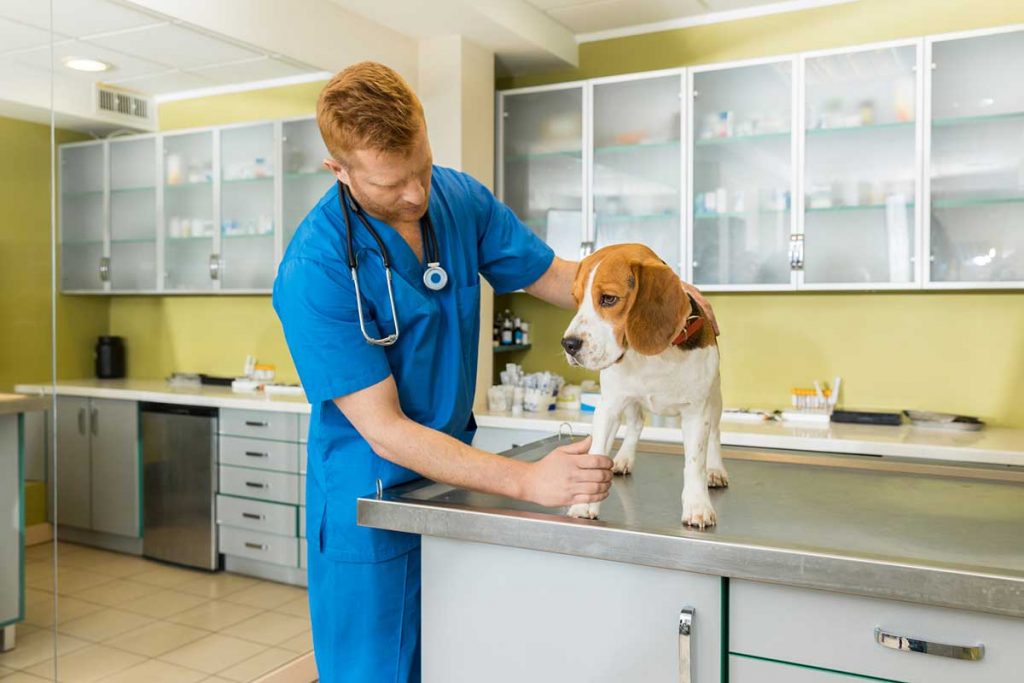If your dog has been in an accident or seems unwell, you will want to rush them to the vet to get them the help they need.
But what about when your dog seems generally well and happy?
How often do you need to take them to the vet just for a routine check-up?
The short answer is about once a year for adult dogs, but more often for puppies and seniors.
Read on for my complete guide on how often to take your dog to the vet and what to expect from your check-up visit.
New Puppies
Whenever you bring a new puppy into your family, you should take them to the vet as soon as possible for a check-up, even though they’ve ideally already been seen by a vet as a young puppy with their breeder.
Still, as well as checking that everything your breeder claims about your new puppy is true, this lets your vet get to know your dog, get a feel for what is normal for them, and build a rapport.
Be sure to take all the medical paperwork your breeder may have shared with you to your vet so they have as much information as possible when checking up on the health of your new puppy.
One tip I’d highly recommend for new puppy owners and vet checks:
Make sure you schedule your appointment ASAP – If you know your getting a puppy then I recommend calling your vet even before your puppy comes home. Vets are impacted and often times you won’t be able to get an appointment for 2-3 weeks from the time you call in.
Also, talk to the breeder, rescue, shelter, former owner about your puppy’s health and get as much information as possible. When we raised and fostered litters of puppies we sent them home with in as good of shape as possible.
Our puppies got their first round of vaccinations, microchip, deworm, and we sent new puppy owners home only after they had a vet health checkup which included a puppy health checklist.
Puppies – 6 Months
After their first vet check-up, your puppy will need to see the vet several times in the first few months of their lives.
This is mostly for them to get their necessary vaccinations, but your vet will also take a look at your dog’s overall health and just ensure that they are growing and developing the way they should.
The vet will likely weigh and measure your puppy to check if they are on track for their breed, check their teeth and gums, and check their assertiveness and mental development.
Your puppy will receive vaccinations every three to four weeks until they are somewhere between 16 and 20 weeks of age.
The main vaccines your dog needs are for distemper, hepatitis, kennel cough, parvovirus, and parainfluenza, which they will receive as a collective DCPP shot.
They will need a minimum of three rounds but could have four or five rounds of the shot. They will then need to get boosters every one to three years.
Your puppy will also need to get a rabies shot, though exactly when depends on the state you live in. Nevertheless, you can expect this around the four-month mark.
Depending on where you live, your vet might recommend other vaccinations as well, such as for lyme disease.
You will also need to consult with your vet about when to neuter or spay your puppy.
This is usually done somewhere between 6 and 18 months, but this can depend a lot on their breed and circumstances.
However, more vets are recommending waiting longer to spay and neuter dogs due to potential associated health conditions.
Here’s some of the latest information from UC Davis on when to spay and neuter your puppy.
Adult Dogs
Once your dog is about a year old, they will probably need to see the vet a lot less frequently.
They will certainly need to go in at least once every one to three years to get boosters of the DCPP and rabies vaccines, but you should also take them in for a basic wellness test once a year.
Most pet insurance policies cover wellness and preventative care as well as emergency care.
The main things your vet will monitor when seeing your adult dog are their weight and the condition of their teeth.
These are both good indicators of the overall health of your dog, and both can also be causes of more serious issues if not cared for properly.
Obesity can also put pressure on the other organs as your dog’s system struggles to manage their weight.
It can also put pressure on your dog’s joints and skeletal system as they try to run, jump and play with excessive weight.
Additionally, dental issues can cause chronic pain, and gum erosion, tooth loss, and bone loss, which can make it difficult to properly nourish your dog as they may resist eating.
You should be brushing your dog’s teeth every day, but if that is not possible, go for at least once a week. You should ensure your vet gives your dog’s teeth a thorough cleaning as part of their check-up as well.
Your vet will ask you about any changes in your dog’s appearance or behavior to help them determine where to focus their attention.
Changes in eating habits and energy levels can be important signs of other things, as well as changes in their bathroom habits.
Any strange new behaviors, such as pacing or staring at walls, are also worth mentioning to your vet.
Finally, your vet may also suggest stool samples or blood tests to get a closer look at what is going on inside your dog.
Senior Dogs
Just as when humans get older their health tends to become more fragile, the same is true for dogs.
Exactly when a dog becomes a senior depends on the breed, but most dogs reach this life stage at around 7 to 9 years old. Larger dogs tend to age and enter their senior years sooner than smaller dogs.
Assuming your dog is not showing any specific symptoms, you should take your senior dog to the vet about twice a year.
This is because early detection is often essential for treating conditions that more commonly show up later in your dog’s life such as cancer and tumors.
Your vet will also probably want to run more tests on your dog to give them a more thorough check-up. You can expect blood work and x-rays to help your vet keep an eye on their bones and organs.
Other Times To Visit The Vet
In the above sections, I’ve mainly addressed how often to visit your vet for a routine wellness check-up. However, there are many other things that should trigger a vet appointment.
For example, you will need to make an emergency vet appointment if your dog is in an accident, breaks a bone, loses consciousness, or otherwise has a crisis.
But what other symptoms should you be concerned about?
Diarrhea And Vomiting
It is normal for your dog to vomit or have an unpleasant poop if they eat something they shouldn’t have. Vomiting once or twice in a morning is a reason to monitor your dog, not necessarily rush them to the vet.
But if your dog is vomiting or has diarrhea for more than 24 hours or if there is blood in their urine, vomit, or stool, it is time to go to the vet.
This is a sign that something isn’t quite right in their stomach. Also, your vet will be able to help ensure your dog stays nourished and hydrated even if they aren’t able to keep anything down.
Pale Gums Or Excessive Drooling
If anything seems strange about your dog’s mouth, it is worth taking a closer look.
Excessive drooling and apparent discomfort in the mouth could just be down to a foreign object lodged there that you can remove yourself.
If you can’t find anything in your dog’s mouth or throat, it’s best to go to the vet to pinpoint the issue causing the discomfort or pain.
Pale gums are a particular concern, since they can be a sign of anemia or a low blood cell count, which can indicate internal bleeding or blood diseases like autoimmune diseases and blood clotting abnormalities.
Swollen Or Hard Stomach
You are what you eat, and issues with your dog’s stomach can be an indicator of a more serious health issue.
If your dog’s stomach is swollen, hard, or sensitive to the touch, this usually means there is an issue with their digestive system that warrants a trip to the vet.
Signs Of Pain
Your dog can’t tell you if they are in pain, but you can observe their behavior for signs of discomfort and pain.
Look out for symptoms such as an aggressive or grumpy temperament, panting or crying, excessive licking or scratching in an area, hiding from the family, loss of appetite, difficulty moving, and unusual posture, such as always keeping their posterior in the air.
Any Significant Changes
Dogs are creatures of habit, so any big changes in their appearance or behavior can be signs they are experiencing a health problem like illness or injury.
Any major noticeable differences in their behavior, personality, or appearance are worth checking with your vet about. Even if the new behavior seems harmless, it’s still a good idea to mention it to your vet.
Veterinary Wellness Checks
Even healthy dogs need to see the vet! A regular wellness check can determine minor issues early so they can be treated before they become major issues.
Your vet can also give you valuable advice on how to keep your dog healthy and happy for many years to come.
Most adult dogs only need to see the vet once a year if all else is well. Puppies and senior dogs will need to visit more often and will generally receive a more thorough check-up.
To wrap things up, here are the main reasons why your dog should see a vet:
- Routine wellness check-ups
- Changes in their behavior
- Excessive vomiting and/or diarrhea
- Pale gums
- Signs of pain or discomfort
- Hard or swollen stomach
Do you have a puppy, adult, or senior dog?
How often do you take your dog to the vet?
Tell us about your experiences in the comment section below.

